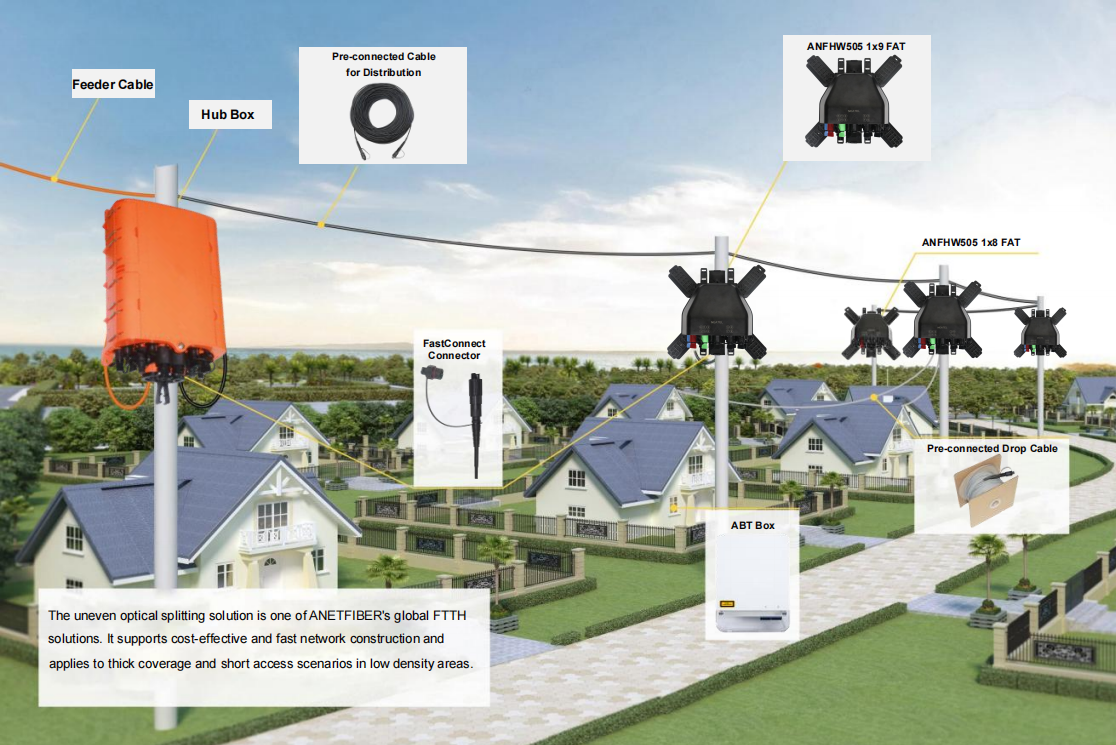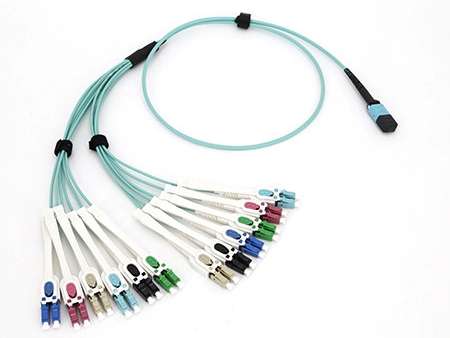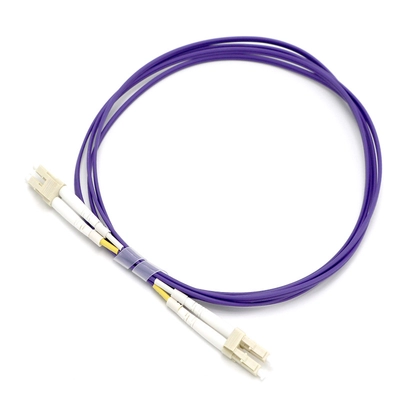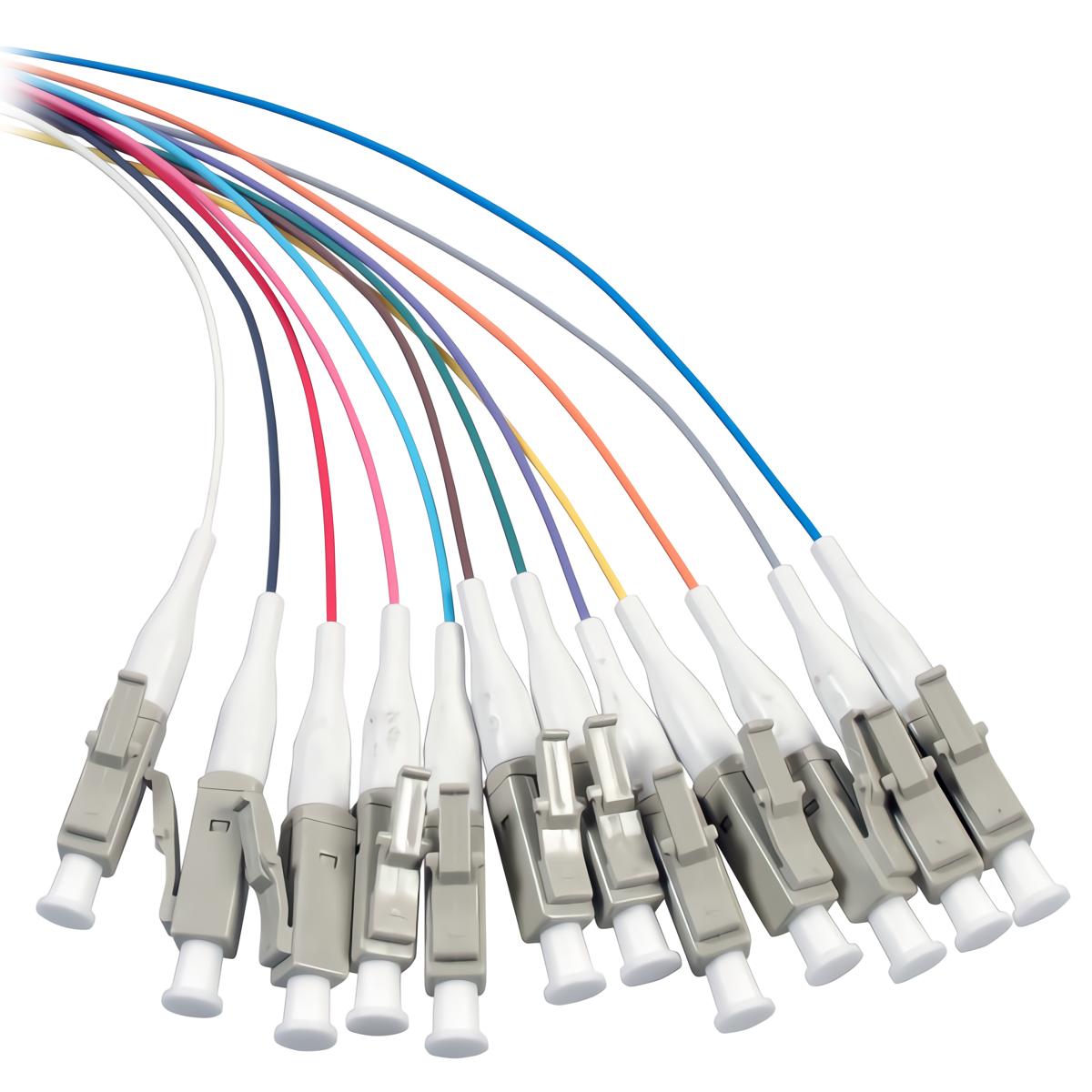Understanding the Benefits of OM1, OM2, OM3, and OM4 Multimode Fiber Patch Cables
Fiber Patch Cable
Fiber patch cable, also known as fiber optic patch cable or fiber jumper, is an essential component in fiber optic communication for seamless data transmission and network connectivity. These cables are designed to connect different types of network devices, providing a reliable and efficient means of transmitting data through their optical fibers. Whether used in telecommunications, healthcare, education, or industrial automation, the role of fiber patch cables cannot be overstated in ensuring the smooth operation of various network infrastructures.
Multimode Fiber Optics
Overview of Multimode Fiber Optics
Multimode fiber optics, often abbreviated as MMF, are a prevalent choice for short-distance communication systems such as local area networks (LANs) and data centers. These optical fibers have a larger core diameter compared to single-mode fibers, allowing multiple modes of light to propagate.
Advantages of Multimode Fiber Optics
Cost-effective solutions: Multimode fiber optics offer a cost-effective means for high-speed data transmission over shorter distances, making them ideal for scenarios where the distance between network devices is limited.
Versatile applications: Due to their ability to support high bandwidth and speed, multimode fiber optics are widely used in various environments such as enterprise networks, educational institutions, and healthcare facilities.
By leveraging the benefits of multimode fiber optics, organizations can establish efficient and reliable communication networks without incurring substantial costs.
OM1 and OM2 Cables
When it comes to fiber patch cables, OM1 and OM2 cables play a significant role in ensuring seamless data transmission over short distances. These cables are specifically designed to offer cost-effective solutions for network installations where the distance between network devices is limited.
Characteristics of OM1 and OM2 Cables
OM1 and OM2 cables are characterized by their ability to efficiently transmit data over short distances. With a core size of 62.5 microns, OM1 cables are suitable for applications where the transmission distance is relatively short. On the other hand, OM2 cables have a core size of 50 microns, allowing for slightly longer transmission distances while still maintaining cost-effectiveness.
Applications of OM1 and OM2 Cables
OM1 and OM2 cables find widespread applications in local area networks (LANs), private networks, and small-scale data center environments. Their cost-effective nature makes them an ideal choice for scenarios where high-speed data transmission over short distances is required without incurring substantial expenses.
By utilizing OM1 and OM2 cables, organizations can establish reliable network connections within confined spaces without compromising on performance or reliability.
OM3 and OM4 Cables
When it comes to high-performance fiber optic communication, OM3 and OM4 cables play a pivotal role in meeting the demands of modern networking environments. These cables are designed to offer enhanced capabilities, making them ideal for scenarios where high-speed data transmission and longer distances are required.
Features of OM3 and OM4 Cables
Higher Bandwidth: One of the key features of OM3 and OM4 cables is their ability to support higher bandwidth compared to their predecessors, OM1 and OM2. This increased bandwidth allows for the efficient transmission of large volumes of data, catering to the needs of high-speed networks and data centers.
Longer Transmission Distances: Unlike OM1 and OM2 cables, OM3 and OM4 cables can transmit data over longer distances without compromising on performance. This feature makes them suitable for applications where network devices are spread across larger areas or multiple floors within a building.
Advantages of OM3 and OM4 Cables
Ideal for High-Speed Networks: With their ability to support higher bandwidth and longer transmission distances, OM3 and OM4 cables are well-suited for high-speed networks that require seamless connectivity with minimal signal loss.
Perfect for Data Centers: The enhanced capabilities of these cables make them an ideal choice for data center environments where efficient data transmission over extended distances is crucial. Their reliability contributes to the overall performance and stability of data center operations.
By leveraging the features and advantages offered by OM3 and OM4 cables, organizations can ensure that their network infrastructure meets the requirements of modern high-performance applications while maintaining reliability and efficiency.
Applications and Benefits
Diverse Applications of Multimode Fiber Patch Cables
Telecommunications: Multimode fiber patch cables are extensively utilized in telecommunications for high-speed data transmission, supporting the seamless flow of information across various network components.
Healthcare: In the healthcare industry, multimode fiber patch cables play a critical role in enabling efficient communication between medical devices, diagnostic equipment, and data management systems, ensuring reliable and secure data transfer.
Education: Educational institutions benefit from the use of multimode fiber patch cables to establish robust network connections for e-learning platforms, administrative systems, and research facilities, facilitating smooth data exchange and access to online resources.
Industrial Automation: Multimode fiber patch cables are integral to industrial automation processes, providing reliable connectivity for control systems, monitoring devices, and data analysis tools essential for optimizing production and operational efficiency.
Key Benefits of Using Multimode Fiber Patch Cables
Using the right type of multimode fiber patch cable can significantly enhance network performance and reliability. These benefits include:
High Bandwidth Support: Multimode fiber patch cables offer high bandwidth capabilities, allowing for the efficient transmission of large volumes of data at high speeds.
Cost-Effectiveness: They provide cost-effective solutions for short-distance data transmission needs without compromising on performance or reliability.
Versatility: Their ability to support various applications across different industries makes them a versatile choice for diverse networking requirements.
These key benefits make multimode fiber patch cables an indispensable component in establishing robust and efficient network infrastructures across various sectors.
Fiber Patch Cable
In conclusion, having a comprehensive understanding of the benefits and applications of OM1, OM2, OM3, and OM4 multimode fiber patch cables is crucial for individuals involved in network infrastructure. These fiber patch cables, also known as fiber optic patch cables or fiber jumpers, play a pivotal role in ensuring seamless data transmission and network connectivity across various industries. Whether used in telecommunications, healthcare, education, or industrial automation, the versatility and reliability of these optical fiber patch cords make them an indispensable component in establishing robust and efficient network infrastructures.
See Also
The Future of Outdoor Fiber Patch Cables: Exploring the Advantages of Preconnection Solutions
The Future of Fiber Optic: Exploring the Benefits of 24 Fiber MPO Cables
Boost Network Performance with Multimode OM4 MPO to MPO Fiber Trunk Cable
The Future of Fiber Optic Cable Splice Closures: Trends and Innovations
Understanding the Uses and Maintenance of Outdoor Optic Cables for Efficient Networking
About US
Follow Us
AnetFiber company's main products are indoor and outdoor optical fiber cables, outdoor waterproof pre-connected fiber-to-the-home products, PLC optical fiber splitters, optical fiber jumpers and pigtails, MTP®/MPO high-density big data product solutions, optical fiber field quick connectors and research and development molding, injection molding and production of optical fiber distribution boxes, optical fiber chassis cabinets, the market has expanded to the world, Europe, America, Asia, the Middle East and Latin America.
Address
Shenzhen City, Baoan District, Yanluo Street, Tangxiayong Community, Yangyong Industrial Road, Tonggangda New Energy Vehicle Park 406
Contacts
+86 199 2655 3586




